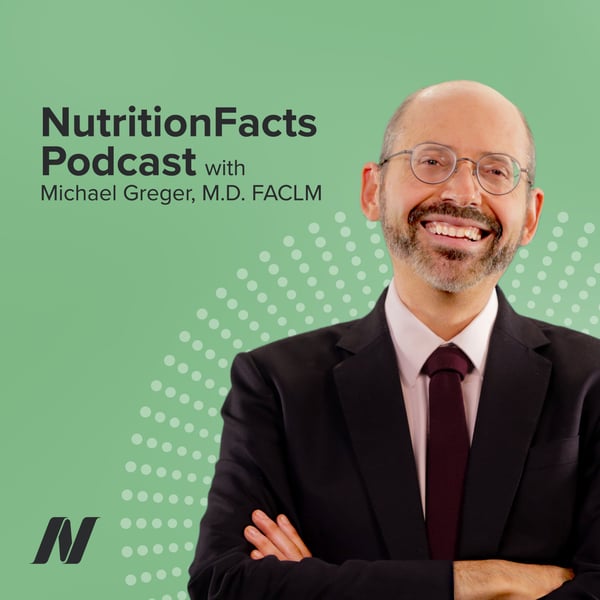Exactly When Should We Eat?
Nutrition Facts with Dr. Greger
[email protected]
4.8 • 3.6K Ratings
🗓️ 16 April 2020
⏱️ 12 minutes
🧾️ Download transcript
Summary
This episode features audio from Time-Restricted Eating Put to the Test and The Benefits of Early Time-Restricted Eating. Visit the video pages for all sources and doctor's notes related to this podcast.
Transcript
Click on a timestamp to play from that location
| 0:00.0 | Have you ever noticed that every month seems to bring a trendy new diet and yet |
| 0:05.9 | obesity rates continue to rise and with it a growing number of health problems. |
| 0:10.8 | That's why I wrote my new book How Not To Diet. Check it out at your local public |
| 0:18.0 | library. Welcome to the Nutrition Facts podcast. I'm your host, Dr. Michael Greger. |
| 0:25.4 | What we eat is most important, but when we eat can make a difference too. In our |
| 0:32.0 | first story we put time restricted eating to the test. The reason many blood tests |
| 0:38.6 | are taken before eating after an overnight fast is that meals can tip our system |
| 0:43.2 | out of balance, bumping up certain biomarkers for disease such as blood sugars, |
| 0:47.1 | insulin, cholesterol, triglycerides. Yet fewer than one in 10 Americans may even |
| 0:52.2 | make it 12 hours without eating. As evolutionarily unnatural eating three meals a day is, |
| 0:58.6 | most of us are eating even more than that. One study using a smartphone app to record more than |
| 1:03.6 | 25,000 eating events found that people tended to eat about every three hours over an average |
| 1:09.2 | span of about 15 hours a day might it be beneficial to give our bodies a bigger break. |
| 1:16.0 | Time restricted feeding is defined as fasting for periods of at least 12 hours but less than 24 hours. |
| 1:22.0 | This involves trying to confine calorie intake to a set window of time, typically three to four |
| 1:27.6 | hours, seven to nine hours, or 10 to 12 hours a day resulting in a daily fast lasting 12 to 21 hours. |
| 1:35.2 | When mice are restricted to a daily feeding window they gain less weight even when fed the exact |
| 1:40.4 | same amount. Rodents have such high metabolism so that a single day of fasting can starve |
| 1:46.1 | away as much as 15% of their lean body mass. This makes it difficult to extrapolate from mouse models. |
| 1:53.2 | You don't know what happens in humans until you put it to the test. The dropout rates in |
| 2:00.7 | time restricted feeding trials certainly appear lower than most prolonged forms of intermittent fasting |
| 2:06.0 | suggesting it's more easily terrible but does it work. If you have people even just stop eating |
... |
Transcript will be available on the free plan in -1809 days. Upgrade to see the full transcript now.
Disclaimer: The podcast and artwork embedded on this page are from [email protected], and are the property of its owner and not affiliated with or endorsed by Tapesearch.
Generated transcripts are the property of [email protected] and are distributed freely under the Fair Use doctrine. Transcripts generated by Tapesearch are not guaranteed to be accurate.
Copyright © Tapesearch 2025.

